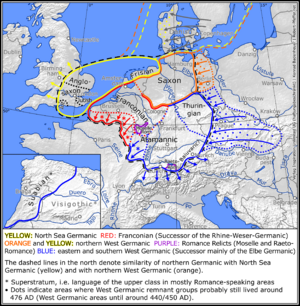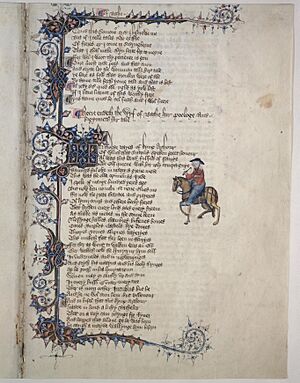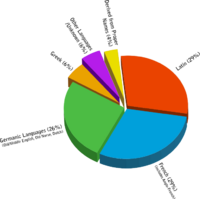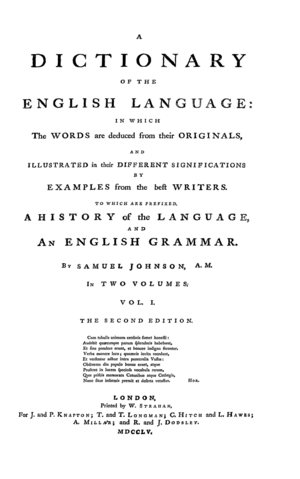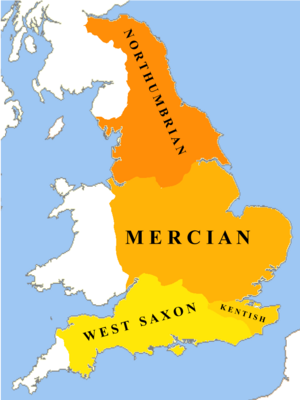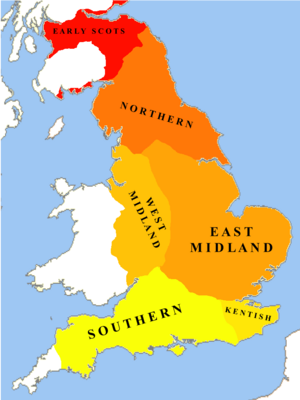History of English facts for kids
English is a West Germanic language that started in Britain. It came from languages spoken by Anglo-Saxon people. These people moved to Britain around 450 to 650 AD. They came from places like northwest Germany, southern Denmark, and the Netherlands.
The Anglo-Saxons settled in the British Isles. Their languages took over from the Celtic languages that were there before. The earliest form of English, called Old English, was different in various parts of Britain. Later, a dialect called Late West Saxon became the most important.
A big change happened when Vikings from Scandinavia came to Britain. They conquered parts of Britain in the 8th and 9th centuries. Their North Germanic languages mixed with Old English. This added many new words and made English grammar simpler.
After the Norman conquest in 1066, Anglo-Norman (a type of French) became the language of the upper classes. This marked the start of Middle English. Many French words came into English, especially for things like church, law, and government. Middle English was spoken until the late 1400s. The way words were spelled back then is still mostly used today. But how we say words has changed a lot since then.
Early Modern English began around 1500. This is the language William Shakespeare used. It borrowed many words from Latin and Ancient Greek. It also took words from other European languages like French and German. A major change in how words sounded, called the Great Vowel Shift, happened during this time. By the late 1600s, Modern English was mostly like what we speak today.
English spread around the world because of British colonisation. Now, it's the main language in Britain, Ireland, the United States, Canada, Australia, and New Zealand. It's also widely spoken in India and parts of Africa. In the last 50 years, English has become a global language. It's used for business, science, and talking across countries.
Contents
How English Began
English comes from the languages of Germanic peoples in northern Europe. These people moved into Britain between the 5th and 7th centuries. This happened after the Romans left the island.
The Anglo-Saxon Chronicle says that around 449 AD, a British king named Vortigern invited the "Angle kin" to help fight invaders. This led to many settlers coming to Britain. They set up seven kingdoms, known as the heptarchy.
The languages these Germanic people spoke were part of the West Germanic family. They were dialects from the Ingvaeonic group. These were spoken around the North Sea in places like modern Denmark, northwest Germany, and the Netherlands. Early English and Old Frisian are very similar.
These early dialects had many grammatical endings. Most words came from the main Germanic group. But because these people had contact with the Roman world, their languages already had some loanwords from Latin. For example, the word for wine came from the Latin word vinum.
Old English: The First English
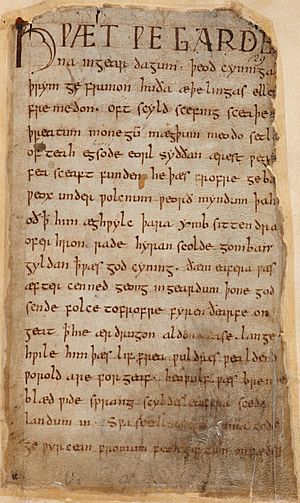
The Germanic settlers in Britain spoke different dialects. These dialects grew into what we call Anglo-Saxon, or Old English. It replaced the Celtic languages in parts of Britain. Old English had different local versions. The four main ones were Mercian, Northumbrian, Kentish, and West Saxon. West Saxon became the main written form.
Old English was first written using runes. Later, it used a version of the Latin alphabet brought by Irish missionaries. The most famous Old English story is the poem Beowulf.
When Christianity arrived around 600 AD, over 400 Latin words were added to Old English. Words like priest, paper, and school come from this time.
Most English speakers today cannot understand Old English. This is because Old English grammar was very different. It had many grammatical endings, like modern German. The Old English period ended after the Norman conquest in 1066.
Vikings Change English
Vikings from Norway and Denmark started raiding Britain in the late 700s. In 865, a large Viking army took over much of northern and eastern England. This area was called the Danelaw.
The Vikings spoke Old Norse, a North Germanic language. Old English and Old Norse were related. Many of their words were similar. Many place names in the Danelaw area are from Old Norse. For example, names ending in -by.
People speaking Old English and Old Norse lived side by side. This led to many Norse words being borrowed into English. About 2000 words from Old Norse came into English. Many of these are common words today. These include anger, bag, both, hit, law, leg, same, skill, sky, take, and window. Even the pronoun they comes from Norse.
Norse influence also helped simplify English grammar. It led to the loss of grammatical gender and many case endings.
Middle English: A New Mix
Middle English was spoken from the Norman Conquest in 1066 until the end of the 1400s.
After the Conquest, the Norman kings and nobles spoke Anglo-Norman. This was a type of French. English remained the language of common people. But many merchants and lower nobles spoke both languages. Middle English was greatly changed by Anglo-Norman and later French.
For centuries, French was the language of courts and government. About 10,000 French words came into Middle English. These were words for government, church, law, military, fashion, and food. Even though English is a Germanic language, it has many words from French and Latin. This connection started with the Norman Conquest.
English literature started to appear again after 1200. This was when Anglo-Norman became less important. In 1362, King Edward III was the first king to speak to Parliament in English. By the end of the 1300s, even the royal court used English.
Geoffrey Chaucer, who wrote in the late 1300s, is the most famous writer from this time. His best-known work is The Canterbury Tales.
English changed a lot during the Middle English period. Its vocabulary, pronunciation, and grammar all changed. Old English had many grammatical endings. But in Middle English, these endings became much simpler. For example, the old plural ending -en (like in children) mostly changed to -s. Also, grammatical gender was removed. The word the appeared around 1200.
English spelling was also changed by Norman French. The sounds th were spelled th instead of the Old English letters þ and ð.
Early Modern English: Shakespeare's Time
English sounds changed a lot during the 1400s. But the spelling stayed mostly the same. Modern English is often said to start with the Great Vowel Shift. This was a big change in how long vowels were pronounced. It happened mainly in the 1400s.
The printing press also helped standardize English. It made spelling and capitalization more regular. By the time of William Shakespeare (mid-1500s to early 1600s), the language looked much like modern English. In 1604, the first English dictionary, A Table Alphabeticall, was published.
More people could read and travel. This led to many foreign words being adopted. Especially words from Latin and Greek. These were often for new ideas not found in English words.
Modern English: Today's Language
The first important English dictionary was Dictionary of the English Language. It was published by Samuel Johnson in 1755. This dictionary helped standardize English spelling and word use.
Early Modern English and Late Modern English (what we speak today) are mostly different in their vocabulary. Late Modern English has many more words. These new words came from the Industrial Revolution and new technologies.
The British Empire spread English around the world. English borrowed words from many countries. Today, British English and North American English are the two main types. About 400 million people speak them. Over one billion people worldwide might speak English.
Grammar Changes Over Time
The English language used to have a complex grammar system. It was similar to Latin or German. Old English had different endings for nouns and pronouns. These endings showed if a word was the subject, object, or possessor.
This system became much simpler during the Middle English period. For example, the old object and indirect object forms of pronouns combined into one form. This is called the oblique case or object case. So, words like whom and him are used for objects of verbs or after prepositions.
Modern English nouns only have one special ending: the possessive case (like dog's).
How Pronouns Changed
Let's look at how some pronouns changed over time.
"Who" and "What"
| Type | Old English | Middle English | Modern English | |
|---|---|---|---|---|
| For people | Subject | hwā | who | who |
| Object | hwone, hwæne, hwām, hwǣm | whom | whom, who | |
| Possessive | hwæs | whos | whose | |
| For things | Subject/Object | hwæt | what, whom | what |
| Why | hwȳ, hwon | why | why | |
| Possessive | hwæs | whos | whose (usually "of what") |
"I" and "We"
| Type | Old English | Middle English | Modern English | |
|---|---|---|---|---|
| Singular (one person) | Subject | iċ | I, ich, ik | I |
| Object | mē, meċ | me | me | |
| Possessive | mīn | min, mi | my, mine | |
| Plural (more than one person) | Subject | wē | we | we |
| Object | ūs, ūsiċ | us | us | |
| Possessive | ūser, ūre | ure, our | our, ours |
"You"
| Type | Old English | Middle English | Modern English | |
|---|---|---|---|---|
| Singular (one person) | Subject | þū | þu, thou | thou (you) |
| Object | þē, þeċ | þé, thee | thee (you) | |
| Possessive | þīn | þi, þīn, þīne, thy; thin, thine | thy, thine (your, yours) | |
| Plural (more than one person) | Subject | ġē | ye, ȝe, you | you |
| Object | ēow, ēowiċ | you, ya | you | |
| Possessive | ēower | your | your, yours |
Note: In Old English, þ and ð were used for the th sound. The letter ȝ (yogh) was used for sounds like y or gh.
"He", "She", "It", "They"
| Type | Old English | Middle English | Modern English | |
|---|---|---|---|---|
| He (male singular) | Subject | hē | he | he |
| Object | hine, him | him | him | |
| Possessive | his | his | his | |
| She (female singular) | Subject | hēo | heo, sche, ho, he, ȝho | she |
| Object | hīe, hire | hire, hure, her, heore | her | |
| Possessive | hire | hir, hire, heore, her, here | her, hers | |
| It (thing singular) | Subject/Object | hit | hit, it, him | it, they |
| Possessive | his | his | its, their | |
| They (plural) | Subject | hīe | he, hi, ho, hie, þai, þei | they |
| Object | hīe, him | hem, ham, heom, þaim, þem, þam | them | |
| Possessive | hira | here, heore, hore, þair, þar | their, theirs |
Fun Fact: The modern words they, them, and their came from Old Norse!
Examples of English Through Time
Old English: Beowulf
Beowulf is a very old English poem. It was written between the 700s and early 1000s. Here are the first few lines:
Hwæt! Wē Gār-Dena in geārdagum, þēodcyninga þrym gefrūnon, hū ðā æþelingas ellen fremedon.
And here is what it means in modern English:
Lo, praise of the prowess of people-kings
of spear-armed Danes, in days long sped,
we have heard, and what honor the athelings won!
Oft Scyld the Scefing from squadroned foes,
from many a tribe, the mead-bench tore,
awing the earls. Since erst he lay
friendless, a foundling, fate repaid him:
for he waxed under welkin, in wealth he throve,
till before him the folk, both far and near,
who house by the whale-path, heard his mandate,
gave him gifts: a good king he!
Middle English: The Canterbury Tales
This is the start of The Canterbury Tales. It's a famous collection of stories by Geoffrey Chaucer. He wrote it in the late 1300s.
Whan that Aprill with his shoures soote
The droghte of March hath perced to the roote,
And bathed every veyne in swich licour
Of which vertu engendred is the flour;
Whan Zephirus eek with his sweete breeth
Inspired hath in every holt and heeth
The tendre croppes, and the yonge sonne
Hath in the Ram his half cours yronne,
And smale foweles maken melodye,
That slepen al the nyght with open yë
(So priketh hem nature in hir corages),
Thanne longen folk to goon on pilgrimages,
And palmeres for to seken straunge strondes,
To ferne halwes, kowthe in sondry londes;
And specially from every shires ende
Of Engelond to Caunterbury they wende,
The hooly blisful martir for to seke,
That hem hath holpen whan that they were seeke.
Early Modern English: Paradise Lost
This is from Paradise Lost, a long poem by John Milton. It was first published in 1667.
Of Mans First Disobedience, and the Fruit
Of that Forbidden Tree, whose mortal tast
Brought Death into the World, and all our woe,
With loss of Eden, till one greater Man
Restore us, and regain the blissful Seat,
Sing Heav'nly Muse, that on the secret top
Of Oreb, or of Sinai, didst inspire
That Shepherd, who first taught the chosen Seed,
In the Beginning how the Heav'ns and Earth
Rose out of Chaos: Or if Sion Hill
Delight thee more, and Siloa's Brook that flow'd
Fast by the Oracle of God; I thence
Invoke thy aid to my adventrous Song,
That with no middle flight intends to soar
Above th' Aonian Mount, while it pursues
Things unattempted yet in Prose or Rhime.
Modern English: Oliver Twist
Here's a part from the novel Oliver Twist. It was written by Charles Dickens in 1838.
The evening arrived: the boys took their places; the master in his cook's uniform stationed himself at the copper; his pauper assistants ranged themselves behind him; the gruel was served out, and a long grace was said over the short commons. The gruel disappeared, the boys whispered each other and winked at Oliver, while his next neighbours nudged him. Child as he was, he was desperate with hunger and reckless with misery. He rose from the table, and advancing, basin and spoon in hand, to the master, said, somewhat alarmed at his own temerity—
"Please, sir, I want some more."
The master was a fat, healthy man, but he turned very pale. He gazed in stupefied astonishment on the small rebel for some seconds, and then clung for support to the copper. The assistants were paralysed with wonder, and the boys with fear.
"What!" said the master at length, in a faint voice.
"Please, sir," replied Oliver, "I want some more."
The master aimed a blow at Oliver's head with the ladle, pinioned him in his arms, and shrieked aloud for the beadle.
See also
 In Spanish: Historia del idioma inglés para niños
In Spanish: Historia del idioma inglés para niños
- Influence of French on English
- Comparison of American and British English
- English phonology
- English studies
- Languages in the United Kingdom
- History of the Scots language
Lists:
- List of dialects of the English language
- List of Germanic and Latinate equivalents
- Lists of English words of international origin


